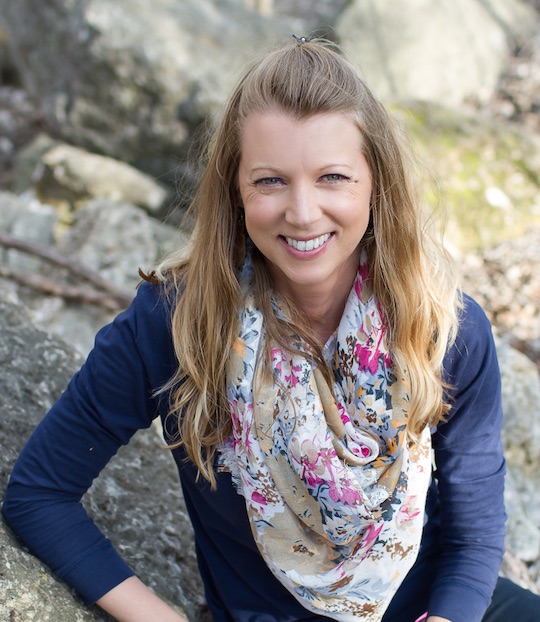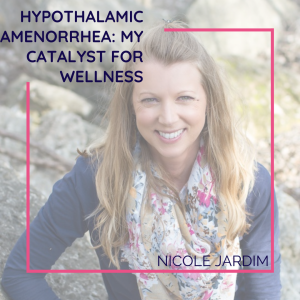Guest post by one of my very talented apprentices Sarah McElvain, on her experience overcoming Hypothalamic Amenorrhea.
My first bout with hypothalamic amenorrhea (HA) surfaced when I stopped taking the pill in my late 20’s. I had a desire to be more natural and didn’t want to take prescription medicine anymore.
After five months without a period, my gynecologist prescribed progesterone. It didn’t work. After another round of progesterone and 9 months without a period, a nurse practitioner told me the best way to regain my cycle was to go back on the pill. Even I knew that wasn’t right!
This ‘advice’ left me skeptical of conventional medicine. There was a failure to listen to the patient, and investigation of root causes took a back seat to pharmacological symptom masking. I did not take the pill and eventually my period returned, but thanks to a diet based mostly on processed foods with lots of fake sugar, so did a host of other unwanted side effects.
Most prominent was digestive distress (diagnosed as IBS), and I struggled with fatigue, joint pain, allergy migraines, brain fog, heart palpitations, and irregular/painful cycles. I saw a gastroenterologist, rheumatologist, endocrinologist, and cardiologist. They ran a battery of tests and everything came back ‘normal.’
Despite me saying I didn’t want medication, the gastroenterologist wrote me a prescription for IBS but neglected to mention that it was an anti-depressant. I ended up at an internist’s office and she convinced me that the answer to all of these problems was hormonal contraception. She prescribed me the Nuvaring, and I was so defeated and desperate for normalcy that I used it.
Fast forward to age 34…
…when my husband and I decided that having a baby was in our future. I stopped using the Nuvaring about five months before we wanted to start trying. Several months passed and I still didn’t have a period, so my midwife tested my hormones.
I distinctly remember her voicemail about the results; I had very low levels of all sex hormones and would “need help getting pregnant,” especially because I was within months of the dreaded ‘advanced maternal age.’
That message spurred me to take ownership of my health; I didn’t want to rely on fertility treatments unless I had exhausted all options. I read several holistic health books and got regular acupuncture treatments, massages, and chiropractic adjustments, but seven months later my period still hadn’t returned.
I decided to meet with a reproductive endocrinologist at a fertility clinic for diagnostic purposes. He mentioned the term hypothalamic amenorrhea, but didn’t think I had that because I didn’t overexercise and was of normal body weight. That term stuck with me so I googled it later; there was little information available at the time, but I did find the blog of a new mother who chronicled her journey to conception after HA. That blog is what kick-started my hormonal healing.
The doctor planted the seed, but his inaccurate stereotypes about HA body types prevented him from helping me.
While it is true that many women with HA exercise excessively, as in marathon training, or have eating disorders and/or little body fat, these general stereotypes of HA sufferers oversimplify the condition. At the time, I was teaching middle school and coaching cross country and track. I wasn’t a competitive runner, but I enjoyed participating in workouts with my students and felt accomplished after runs. Yet for my body, having a stressful job and running even a few miles a week were enough to prevent hormonal balance.
My moderate exercise combined with poor diet (restrictive eating, consumption of fake sugar, wannabe veganism) and years of endocrine system disruption via hormonal contraception were the perfect storm for hormonal dysfunction. While doctors inquired about and applauded my active lifestyle, not one asked me about nutrition or intake of fat in my diet.
One trend that has been devastating to women’s hormonal health (other than the rampant use of hormonal birth control) is the shaming of fatty foods – our hormonal wellbeing is dependent on natural fats. The more I learned about nourishing my body through adequate rest and eating what my body craved, the better I felt.
Hormonal healing came once I learned to let go
I ate intuitively, stopped doing hot yoga, and exchanged running for restorative yoga and walking. Within one month, my period returned; within three menstrual cycles, I was pregnant (and we now have a super sweet 16 month old son!).
Having HA jumpstarted changes I needed to make and taught me body literacy. Since discovering this condition, I learned just how disconnected I was from my body despite my attempts to be ‘healthy’ with restrictive eating and regimented fitness.
On paper, I was healthy. In reality, I was a tightly wound type A woman. Once I gained knowledge about how to restore my hormonal health (thanks to functional medicine and my own research), I immediately fostered a more relaxed relationship with my body and mind.
My greatest lesson…
The single greatest lesson I learned from having HA was how to SURRENDER. I realized I can’t control my body, but I can facilitate its natural ability to heal. That lesson was timely as it is key to navigating a healthy pregnancy and postpartum recovery.
Thanks to HA, I am now more connected to my body and the world around me. I appreciate my period and view it as a sign of wellness and fertility. I am discovering rhythms of the body that coincide with nature. I’m learning to incorporate ancient wisdom and rituals like sleeping in a dark room, standing barefoot on the grass, and soaking in the light of the full moon. My son benefits as well; he loves the outdoors and we explore nature together.
And because of hypothalamic amenorrhea, I found an incredibly supportive community of wellness seekers and healers. I was so inspired by participating in Nicole’s apprenticeship that I made a career change; I am now a certified doula and training to be a women’s health coach. If it weren’t for my experience with hypothalamic amenorrhea, I may have never unwound and slowed down. Here’s to a PR in wellness and a future of empowering women to optimize their health and grow their families.
 Sarah McElvain, LMSW, CD lives in Austin, TX with her husband and one year old son. She is a licensed master social worker, certified postpartum doula, and future holistic health coach. Sarah is passionate about maternal health and supports women from pre-conception through the postpartum period. As a doula, she specializes in focused planning with soon-to-be moms to best prepare them emotionally and physically for the postpartum recovery period and life with a little one. Sarah has advanced training in supporting women with postpartum mood disorders and works as a volunteer with the Pregnancy and Postpartum Health Alliance of Texas. She also is a labor support companion with GALS (Giving Austin Labor Support) and is completing birth doula training.
Sarah McElvain, LMSW, CD lives in Austin, TX with her husband and one year old son. She is a licensed master social worker, certified postpartum doula, and future holistic health coach. Sarah is passionate about maternal health and supports women from pre-conception through the postpartum period. As a doula, she specializes in focused planning with soon-to-be moms to best prepare them emotionally and physically for the postpartum recovery period and life with a little one. Sarah has advanced training in supporting women with postpartum mood disorders and works as a volunteer with the Pregnancy and Postpartum Health Alliance of Texas. She also is a labor support companion with GALS (Giving Austin Labor Support) and is completing birth doula training.
Sarah trained under Nicole in the 2015 Fix Your Period Apprenticeship and is completing certification as a women’s holistic health coach through the Integrative Women’s Health Institute. She owns an online boutique, Barn Chic Boutique, and is just starting her health coaching and doula business. You can find her on Twitter (@sarahmcatx), Instagram (@sarahmcatx), Facebook, and at mamaexpectations.com




1 thought on “Hypothalamic Amenorrhea: My Catalyst for Wellness”
Thanks for the great read!
I too just found out I have HA. As devastating as it was, I have reduce my weight training from 6 days to 2 days and I just joined a hot yoga studio. I also eliminated all cardio out of my diet for now. Do you think that starting hot yoga though is going to be an issue? I ask, because you stopped your hot yoga and got your period back. I can’t back out now because I’m in a 3 month commitment but I was curious if that might hinder the recovery.